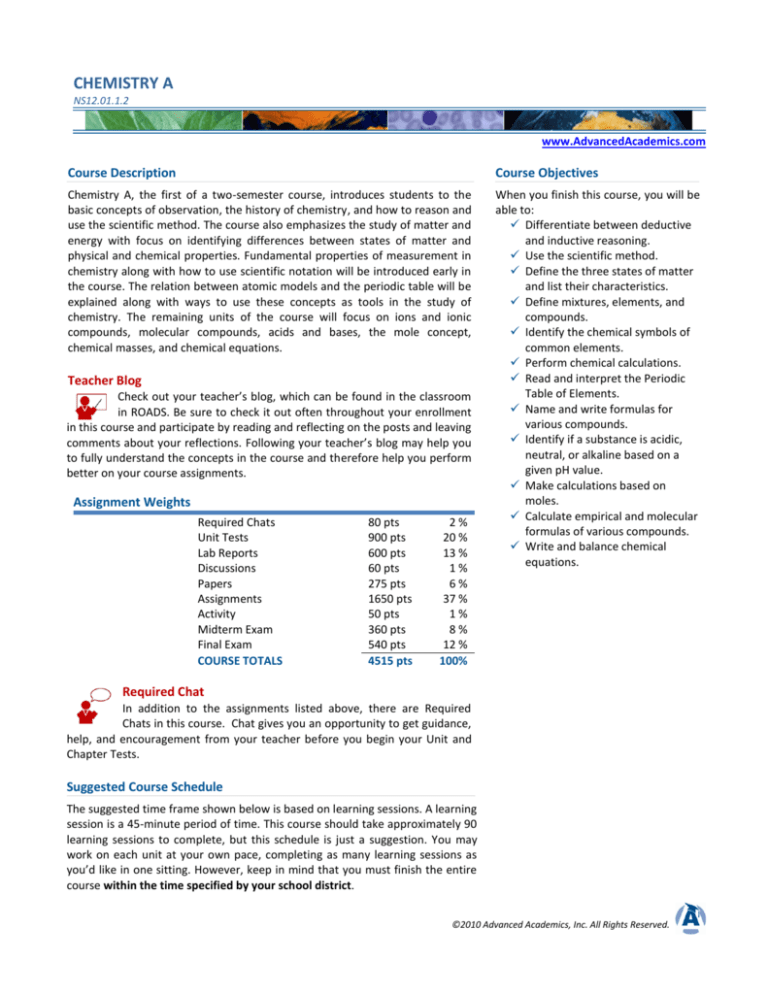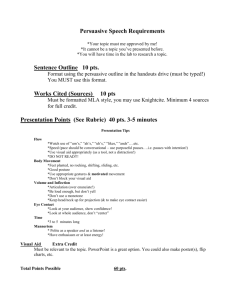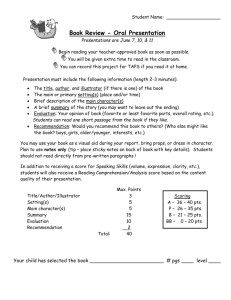
CHEMISTRY A
NS12.01.1.2
www.AdvancedAcademics.com
Course Description
Course Objectives
Chemistry A, the first of a two-semester course, introduces students to the
basic concepts of observation, the history of chemistry, and how to reason and
use the scientific method. The course also emphasizes the study of matter and
energy with focus on identifying differences between states of matter and
physical and chemical properties. Fundamental properties of measurement in
chemistry along with how to use scientific notation will be introduced early in
the course. The relation between atomic models and the periodic table will be
explained along with ways to use these concepts as tools in the study of
chemistry. The remaining units of the course will focus on ions and ionic
compounds, molecular compounds, acids and bases, the mole concept,
chemical masses, and chemical equations.
When you finish this course, you will be
able to:
Differentiate between deductive
and inductive reasoning.
Use the scientific method.
Define the three states of matter
and list their characteristics.
Define mixtures, elements, and
compounds.
Identify the chemical symbols of
common elements.
Perform chemical calculations.
Read and interpret the Periodic
Table of Elements.
Name and write formulas for
various compounds.
Identify if a substance is acidic,
neutral, or alkaline based on a
given pH value.
Make calculations based on
moles.
Calculate empirical and molecular
formulas of various compounds.
Write and balance chemical
equations.
Teacher Blog
Check out your teacher’s blog, which can be found in the classroom
in ROADS. Be sure to check it out often throughout your enrollment
in this course and participate by reading and reflecting on the posts and leaving
comments about your reflections. Following your teacher’s blog may help you
to fully understand the concepts in the course and therefore help you perform
better on your course assignments.
Assignment Weights
Required Chats
Unit Tests
Lab Reports
Discussions
Papers
Assignments
Activity
Midterm Exam
Final Exam
COURSE TOTALS
80 pts
900 pts
600 pts
60 pts
275 pts
1650 pts
50 pts
360 pts
540 pts
4515 pts
2%
20 %
13 %
1%
6%
37 %
1%
8%
12 %
100%
Required Chat
In addition to the assignments listed above, there are Required
Chats in this course. Chat gives you an opportunity to get guidance,
help, and encouragement from your teacher before you begin your Unit and
Chapter Tests.
Suggested Course Schedule
The suggested time frame shown below is based on learning sessions. A learning
session is a 45-minute period of time. This course should take approximately 90
learning sessions to complete, but this schedule is just a suggestion. You may
work on each unit at your own pace, completing as many learning sessions as
you’d like in one sitting. However, keep in mind that you must finish the entire
course within the time specified by your school district.
©2010 Advanced Academics, Inc. All Rights Reserved.
Learning
Session
1-10
Content Covered
Unit 1: The Study of Chemistry
Chemistry is known as the “Central Science” because of its importance in the study of biology and
physics. This unit explores the nature and application of chemistry as a science.
In this unit, there will be:
1 Required Chat
10 pts
3 Assignments
150 pts
1 Discussion
20 pts
1 Lab Report
75 pts
1 Paper
75 pts
1 Unit Test
100 pts
Why is Chemistry called the “Central Science?”
11-20
Unit 2: Matter and Energy
Chemistry is the study of the interaction of matter and energy and the changes that matter can undergo.
In this unit, there will be:
1 Required Chat
10 pts
4 Assignments
200 pts
3 Lab Reports
225 pts
1 Paper
100 pts
1 Unit Test
100 pts
21-30
Unit 3: Measurement and Chemical Calculation
This Unit introduces you to importance to measurement, units, and calculations in the chemical
sciences.
In this unit, there will be:
1 Required Chat
10 pts
6 Assignments
300 pts
1 Lab Report
75 pts
1 Unit Test
100 pts
Think about it - numbers without units are useless!
31-40
Unit 4: Models of the Atom, Atomic Structure and the Periodic Table
Atomic Theory is the basis of the reactivity of atoms and molecules.
In this unit, there will be:
1 Required Chat
10 pts
4 Assignments
200 pts
1 Discussion
20 pts
1 Activity
50 pts
1 Paper
100 pts
1 Unit Test
100 pts
CHEMISTRY A Midterm Exam
360 pts
©2010 Advanced Academics, Inc. All Rights Reserved.
41-50
Unit 5: Ions and Ionic Compounds
In this unit, there will be:
1 Required Chat
5 Assignments
1 Unit Test
10 pts
250 pts
100 pts
Ionic compounds - “opposites attract!”
51-60
Unit 6: Molecular Compounds, Acids and Bases
This Unit introduces you to the naming of molecular compounds, including acids and bases.
In this unit, there will be:
1 Required Chat
10 pts
4 Assignments
200 pts
1 Lab Report
75 pts
1 Unit Test
100 pts
61-70
Unit 7: The Mole Concept
This Unit introduces the concept of the mole as a “counting unit” for calculating amounts of reactants
and products in chemical reactions.
In this unit, there will be:
1 Required Chat
10 pts
4 Assignments
200 pts
1 Unit Test
100 pts
If you had a mole of pennies – would you be rich?
71-80
Unit 8: Chemical Masses
This Unit introduces you to calculations used to determine empirical and molecular formulae.
In this unit, there will be:
1 Required Chat
10 pts
4 Assignments
200 pts
1 Discussion
20 pts
1 Lab Report
75 pts
1 Unit Test
100 pts
81-90
Unit 9: Chemical Equations
Chemical equations represent the process of chemical reactions.
In this unit, there will be:
1 Required Chat
10 pts
3 Assignments
150 pts
1 Lab Report
75 pts
1 Unit Test
100 pts
What does “conservation of mass” really mean?
CHEMISTRY A Final Exam
540 pts
©2010 Advanced Academics, Inc. All Rights Reserved.
Privacy Policy
No member of the Advanced Academics staff is authorized to release student information without the written permission of the
student’s parent or legal guardian. Names, images, and/or class work of Advanced Academics students will not be published in print,
video/film, or on our public website without written student and guardian consent.
Disability Statement
If you have a disability or condition that may affect your ability to succeed in this course, please contact your teacher. It’s important that
you discuss the problem with him or her so accommodations may be made to give you every opportunity to perform well. Your teacher
and virtual school program coordinators are committed to helping students with disabilities succeed, and every request will be treated
with respect and confidentiality.
©2010 Advanced Academics, Inc. All Rights Reserved.







